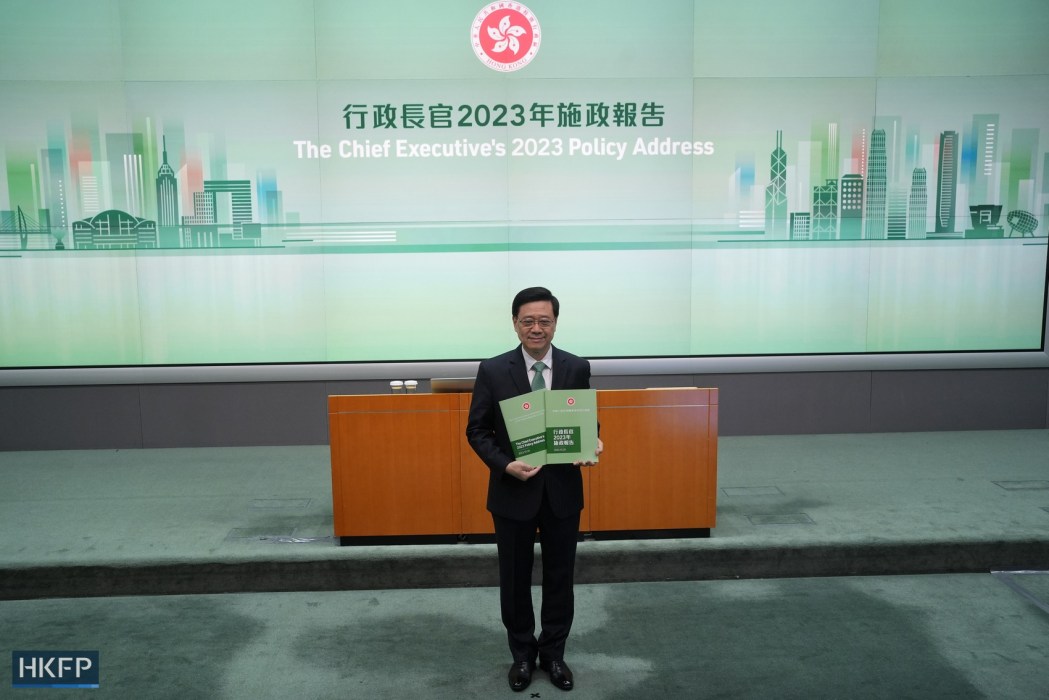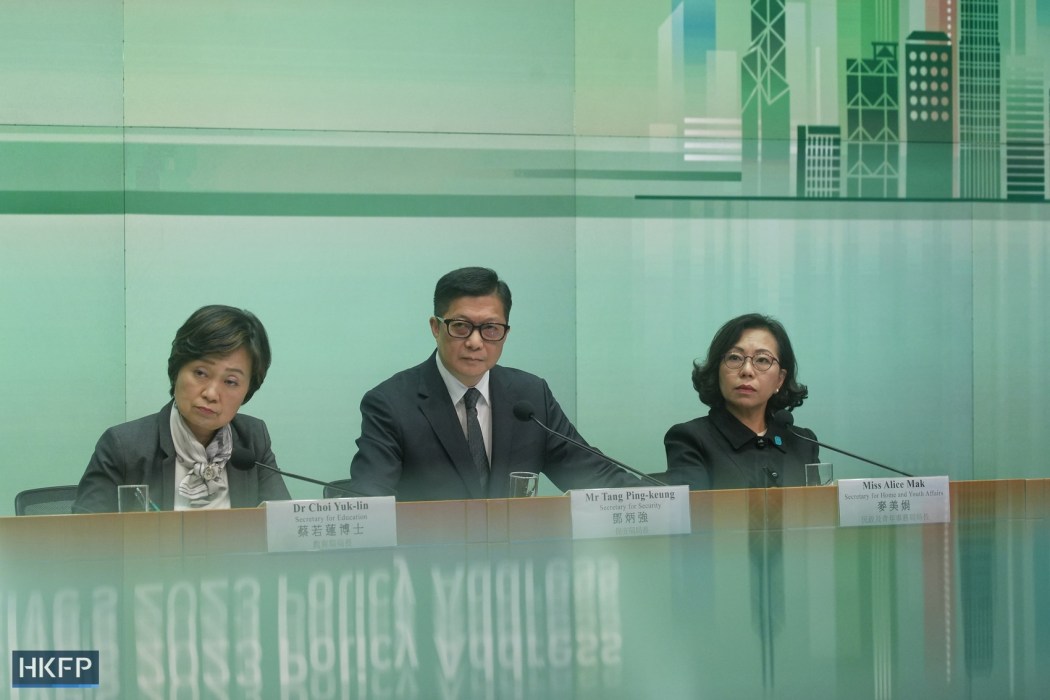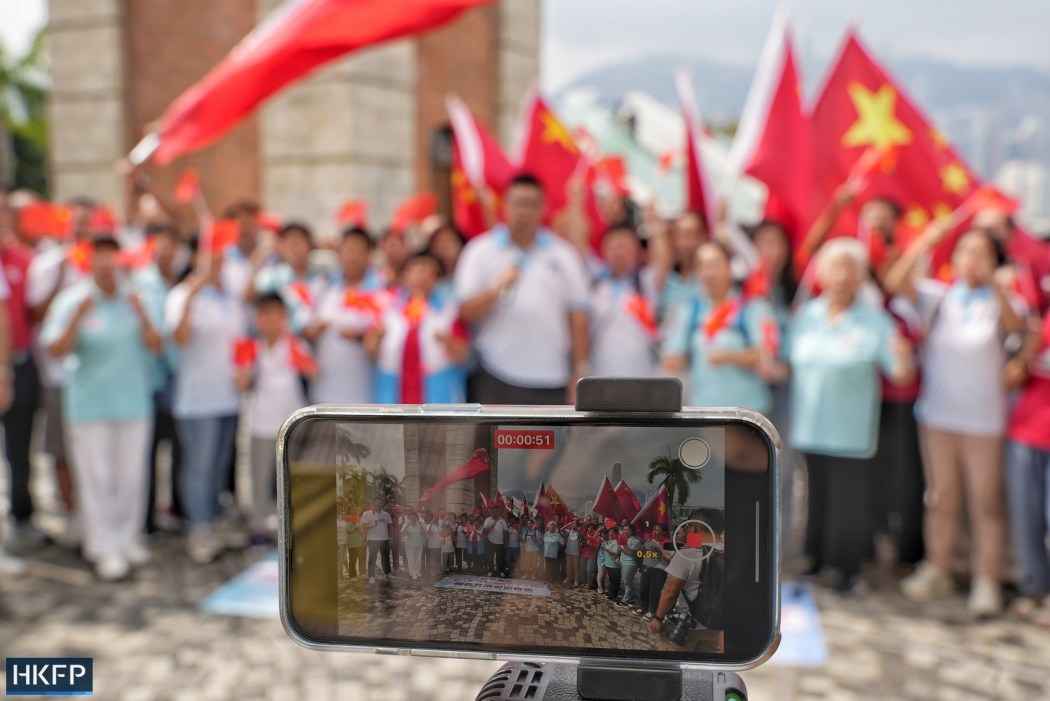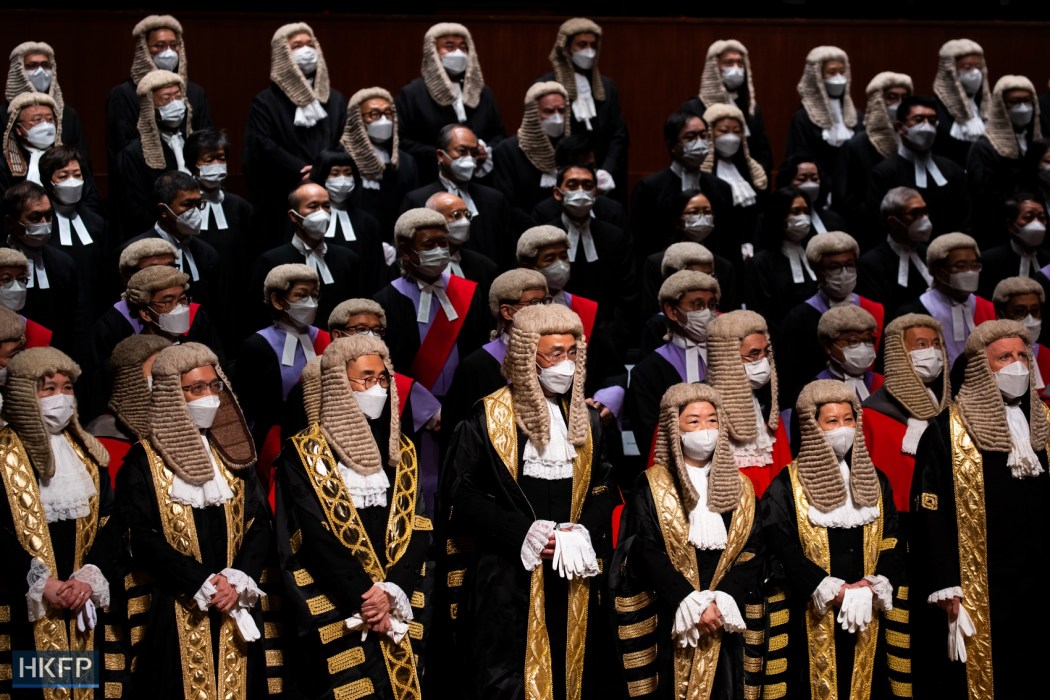In the 40th month since the national security law was enacted, Hong Kong’s courts oversaw several sedition hearings. Although separate from the Beijing-imposed security legislation, prosecutions under the colonial-era sedition law have risen in lockstep since the former came into effect in June 2020.

Despite maintaining that stability has been restored to the city, authorities continue to say that threats to national security remain, vowing to legislate Article 23 – Hong Kong’s own security – law by the end of 2024. As to whether opposing the new law would violate the existing one? Hong Kong’s security chief has not given a clear answer.
New security law
Hong Kong leader John Lee said on October 25 that the city would legislate its own security law in 2024, four years after Beijing imposed a sweeping security law criminalising secession, subversion, terrorism and foreign collusion. While authorities say the legislation has restored stability, critics say it has silenced dissent and freedom of expression.

Lee defended the government’s move to enact more security legislation, after vowing during his second Policy Address to roll out Article 23 of the Basic Law next year.
Article 23 of the Basic Law stipulates that the government shall enact laws on its own to prohibit acts of treason, secession, sedition and subversion against Beijing. Its legislation failed in 2003 following mass protests and it remained taboo until after the onset of the separate, Beijing-imposed security law in 2020. Pro-democracy advocates fear it could have a negative effect on civil liberties but the authorities say there is a constitutional duty to ratify it.
“The 2019 riots, black violence, and the attempted colour revolution happened because of the obvious vacuum situation on legislation regarding national security,” Lee said during a press conference after delivering his Policy Address on October 25.

When asked whether opposing the legislation of Hong Kong’s own security law would violate the national security law, security chief Chris Tang did not give a clear answer.
Patriotic education
Lee also announced that Hong Kong would roll out more patriotic education initiatives – including a revamped museum and a new festival – to ensure “continuity from generation to generation,” during this year’s Policy Address.

The Constitution and Basic Law Promotion Steering Committee will establish a working group on patriotic education, whilst the Leisure and the Culture and Services Department (LCSD) will establish a Chinese Culture Promotion Office.
The measures will be rolled out “with a view to enhancing education on our country’s history, culture and current affairs on different fronts, thereby promoting patriotism and ensuring its continuity from generation to generation,” Lee told lawmakers.
Lee’s announcement came after the Hong Kong government said it welcomed the adoption of China’s patriotic education law, which was passed by the country’s rubber-stamp legislature on October 24.

The law “sets out the main content of patriotic education, covering areas such as ideology and politics, history and culture, national symbols, the magnificent scenery and historical and cultural heritage of the motherland, constitution and law, national unity and ethnic solidarity, national security and defense, and the deeds of heroes and martyrs and role models,” a statement issued by the Constitutional and Mainland Affairs Bureau read.
HKU student union
Four former student leaders of the University of Hong Kong (HKU) were jailed for two years each for incitement to wound over a controversial motion they passed to mourn a man who stabbed a police officer before taking his own life in July 2021.

HKU students Kinson Cheung, Charles Kwok, Chris Todorovski and Anthony Yung, who were remanded in custody last month, appeared before judge Adriana Noelle Tse Ching for sentencing at District Court on October 30.
The four were originally charged with advocating terrorism, but prosecutors agreed to let them plead guilty to an alternative charge of incitement to wound with intent.
Jimmy Lai documentary
A documentary about pro-democracy media tycoon Jimmy Lai remains on YouTube despite a request from Hong Kong police to take it down, a transparency report published by US tech giant Google revealed in late October.

“In April 2023, we received a request from the Hong Kong Police Force (HKPF) to remove 5 videos featuring ‘The Hong Konger’, a documentary about an imprisoned activist from YouTube,” Google’s report read. “The HKPF alleged that the content was seditious in nature and violative of Crimes Ordinance, Cap. 200 and would amount to criminal contempt of Court as the activist’s trial was ongoing.”
The outcome of the request, according to Google was: “We did not remove the 5 videos from YouTube.”
Detained editor’s apology
Ryan Law, the detained former editor-in-chief of defunct pro-democracy newspaper Apple Daily, issued a public apology for publishing reports alleging that two business executives were Chinese spies when the pair was involved in an espionage investigation in Taiwan four years ago.

Law’s statement came days after travel bans barring Chinese businessman Xiang Xin and his wife Kung Ching from leaving Taiwan were lifted.
The Apple Daily reports were published between November 23, 2019, and December 7, 2019 – when the pair was first arrested in Taiwan in connection with a Chinese espionage case.
Sedition in court
Hong Kong man Kurt Leung was sentenced to four months’ jail under the sedition law on October 6 after pleading guilty to importing 18 children’s books about sheep and wolves. The publications were said to be filled with “distorted ideas” and to have intended to incite hatred against the local and Chinese governments among young readers.

In the middle of October, 57-year-old Au Kin-wai was denied bail by a handpicked national security judge after he was arrested by Hong Kong national security police over allegedly posting content “with seditious intention” online.
Au appeared in front of Chief Magistrate Victor So on October 18 at West Kowloon Magistrates’ Courts. He was charged with one count of “doing an act or acts with seditious intention” between April 19 and October 16 over allegedly posting “seditious” content on Facebook and X, formerly known as Twitter.

In late October, Yuen Ching-ting, 23, pleaded guilty to publishing online speech with seditious intent.
Yuen, a second-year student at a university in Japan, was arrested by national security police after arriving in Hong Kong in early March. She was granted bail on a HK$10,000 cash bond and a long list of strict conditions related to social media use.
Owen Chow arrested again
Detained Hong Kong activist Owen Chow was arrested by national security officers, while on remand, on suspicion of “carrying unauthorised items out of a prison.”

Chow and one of his lawyers, Phyllis Woo, 30, appeared at West Kowloon Magistrates’ Courts on October 31. They were charged on Friday over removing unauthorised articles from a prison.
‘Objectionable’ library content
Hong Kong public libraries are set to review their collections after more than 50 reports were made by the public about suspected “objectionable” content found in library books and other titles.

The government received reports under the new “Collection of Views on Library Collections” mechanism, launched in early July, the Leisure and Cultural Services Department (LCSD) said on October 19 in response to HKFP enquiries.
The library materials in question would be reviewed as soon as possible, and if they were found to contain “objectionable contents,” they would be removed from the shelves and withdrawn from the library collection.
Challenge to untaken oath
Hong Kong civil servant Wong Chau-ming, who was forced to retire after failing to take the government’s new loyalty oath on time, saw his attempt to challenge the move rejected in court on October 19.

The 47-year-old’s leave to appeal application centred around the government ordering his retirement from his post as an assistant taxation officer in August 2021, after he failed to sign and return a government loyalty declaration that was made mandatory following the national security law’s enactment.
Hong Kong announced in November 2020 that all civil servants would have to declare allegiance to the city as part of a new oath-taking requirement for employees.
AmCham asks for reassurance
The American Chamber of Commerce (AmCham) in Hong Kong called on the government to provide “straightforward interpretations and applications” of the national security law in this year’s Policy Address.

In a 49-page document, the US chamber made a list of suggestions related to the security legislation, talent attraction, trade, financial services, housing and more.
“AmCham encourages the government to publish well-defined guidelines offering straightforward interpretations and applications of the National Security Law,” the chamber wrote.
“The Government should seek to reassure the business community that laws related to Hong Kong’s national security will be applied narrowly and consistent with the principles of an independent judiciary.”
Cost of national security
The salaries of close to 200 judges and judicial officers in Hong Kong went up by 3.62 per cent. The increase came after a report by the Judicial Committee in July said national security cases and those linked to the 2019 protests posed “mounting challenges” to the Judiciary’s resources and manpower.

Arrest and prosecution tally
As of October 31, 285 people had been arrested for suspected acts and activities that endangered national security since the legislation was enacted, the Security Bureau told HKFP. Among them, 170 people and five companies had been charged under the national security law or the sedition law or with other crimes.
Among the 101 persons who have been convicted or are awaiting sentencing, 32 were charged under the national security law.
Support HKFP | Policies & Ethics | Error/typo? | Contact Us | Newsletter | Transparency & Annual Report | Apps
Help safeguard press freedom & keep HKFP free for all readers by supporting our team























